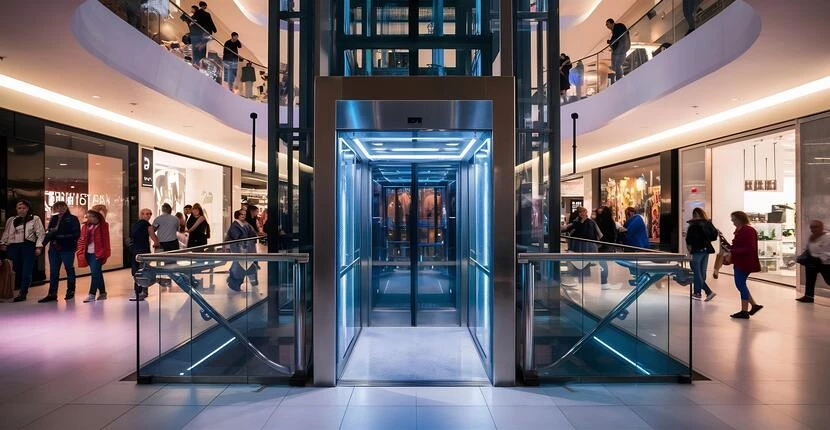
Lifts for Retail Stores
Request a free consultation for retail store lifts today.At Lift Services, we design, supply, and install lifts for retail stores that enhance the customer experience, increase accessibility, and streamline stock handling.
Whether for a small independent shop or a large multi-floor department store, our lifts are built for performance, safety, and style.
We provide passenger lifts for customer use, goods lifts for moving stock, and platform lifts to ensure compliance with accessibility regulations.
All our systems are tailored to your store’s layout, load requirements, and branding.
Request a free consultation for retail store lifts today.
What Are Lifts for Retail Stores?
Lifts for retail stores are vertical transport systems designed to safely and efficiently move customers, staff, and goods between different floors.
They can be traction-driven, hydraulic, or machine-room-less (MRL) systems, depending on the available space and operational needs.
At Lift Services, our retail lifts are designed to be both practical and visually appealing.
They can feature panoramic glass, branded interiors, and custom finishes to complement your store’s design and enhance the customer experience.
How Much Do Lifts for Retail Stores Cost?
The cost of lifts for retail stores is from £25,000 to £100,000.
The cost varies depending on type, capacity, and customisation.
Small passenger lifts for customer access start from around £25,000 to £40,000.
Medium capacity lifts suitable for combined customer and goods use average £40,000 to £70,000.
Heavy-duty goods lifts for large stock movements can exceed £100,000.
Every project is priced individually following a site survey to ensure the lift fits your operational and aesthetic requirements.
What Are The Benefits of Lifts for Retail Stores?
The main benefit of a lift in a retail store is improved accessibility and operational efficiency.
The key benefits:
Provides inclusive access for all customers
Speeds up stock movement between floors
Enhances store appearance with stylish designs
Complies with UK accessibility regulations
Improves staff safety by reducing manual handling
Where Are Retail Store Lifts Commonly Installed?
Retail store lifts are commonly installed in shopping malls, department stores, supermarkets, and multi-level boutiques.
Shopping malls use lifts for customer movement between floors.
Department stores install lifts for shoppers and stock transfer. Supermarkets use lifts to move goods from storage to sales areas.
Multi-level boutiques install lifts to improve accessibility and customer convenience.
What Types of Retail Lifts Do You Offer?
Retail lift types offered include passenger lifts, platform lifts, and freight lifts.
Passenger lifts transport customers between retail floors with comfort and safety.
Platform lifts provide accessibility for wheelchair users and those with limited mobility.
Freight lifts handle stock movement, large goods, and deliveries between storage areas and shop floors.
All lift types meet retail safety, capacity, and accessibility requirements.
Can a Lift Be Installed in an Existing Store?
Lifts can be retrofitted into existing retail spaces, although this may require structural changes. We work to minimise disruption so your store can continue trading.
A lift can be installed in an existing store, provided that a structural assessment, space planning, and regulatory compliance are met.
Installation requires evaluating load-bearing capacity, available shaft space, and customer access points.
Compact passenger lifts, platform lifts, and freight lifts can be adapted for retrofit projects.
Modifications may include pit construction, machine room installation, or reinforcement of structural elements.
All installations must meet safety codes and accessibility standards.
How Long Does Installation Take?
Standard installations take between 4 and 6 weeks.
Larger or more complex projects may take longer, especially if significant building modifications are needed.
Retail lift installation takes 3 to 8 weeks, depending on lift type, building design, and site readiness.
New builds with pre-planned shafts allow faster installation.
Retrofitting existing retail spaces can take longer due to the need for structural changes and adjustments to utilities.
Timelines also depend on permit approvals, safety inspections, and final commissioning before the lift enters service.
Are Retail Lifts Safe for Public Use?
Retail lifts are safe for public use when installed, maintained, and inspected according to safety regulations.
Safety systems include emergency brakes, door interlocks, overload protection, and backup power.
Routine inspections verify the mechanical reliability and operational safety of equipment.
Modern retail lifts feature smooth acceleration controls and compliance with accessibility standards to ensure safe transportation for all passengers in shopping environments.
What Maintenance Is Recommended?
Recommended lift maintenance includes safety inspections, lubrication, component servicing, and operational testing.
Safety inspections verify the condition of brakes, doors, and emergency systems. Lubrication of guide rails and moving parts prevents wear. Component servicing addresses cables, pulleys, hydraulics, and control panels.
Operational testing ensures smooth performance and compliance with safety regulations.
Maintenance schedules should adhere to manufacturer guidelines and relevant legal requirements.
Can the Lift Interior Match My Store’s Branding?
Lift interiors can match store branding through customised finishes, colours, and graphics. Options include branded wall panels, flooring, and lighting schemes.
Vinyl wraps or printed graphics can display logos and marketing visuals. Material choices, such as glass, stainless steel, or wood finishes, can align with a store's aesthetics.
All branding modifications must comply with lift safety standards and manufacturer specifications.
Get a Free Quote for Retail Store Lifts Today
If your store needs a retail lift that combines style, safety, and efficiency, Lift Services can provide a tailored solution.
Contact us today to arrange a free site survey and personalised quotation.
